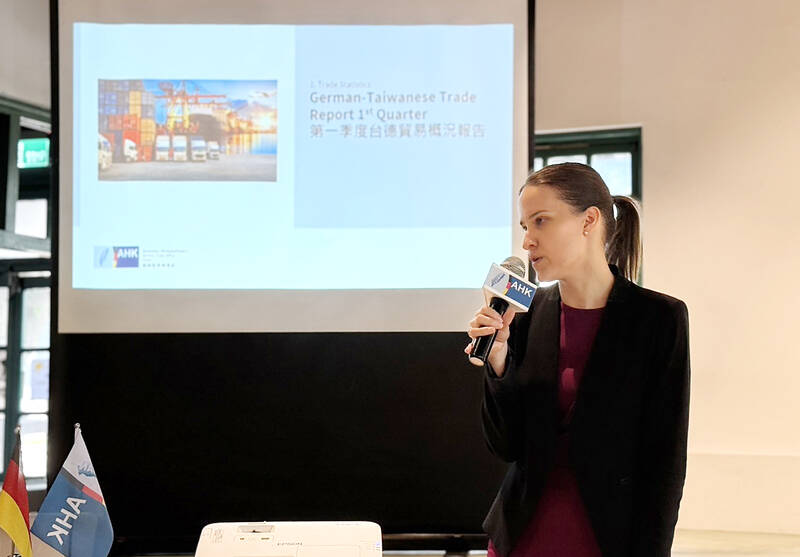The German Trade Office Taipei yesterday pressed for closer trade ties with Taiwan, calling Taiwan a stable market and local firms reliable partners amid rising global uncertainty linked to US tariff challenges.
“In today’s uncertain global environment, companies value reliable partners and stable markets more than ever,” the trade office said in a report. “Taiwan is exactly such a market and we will continue fostering bilateral exchange and advancing Germany-Taiwan economic cooperation to new heights.”
The office last month conducted a survey to assess the impact of global political developments on business strategies, with a focus on the implications of the German federal election and the return of US President Donald Trump to the White House.

Photo: CNA
Most German businesses in Taiwan reported limited direct effects from the German election, and many expressed hope that the new government would strengthen economic and investment ties with Taiwan.
By contrast, US trade policies under Trump have raised concern, as more than 50 percent of companies said they expect a negative impact on their operations and more than 30 percent were considering supply chain adjustments, it said.
Another 25 percent plan to bolster cooperation with Taiwanese partners to diversify risk, the trade office said.
German Trade Office Taipei Chief Representative and Executive Director Eva Langerbeck said she observed strong interest from German companies in the Taiwanese market, especially in areas such as aerospace, energy, transportation and smart cities.
According to the Ministry of Finance, bilateral trade between Taiwan and Germany was US$5 billion in the first quarter of this year, a 2 percent increase year-on-year, the office said.
Taiwan’s main exports to Germany were information and communications technology, electronic parts, audio-video products, vehicles, aircraft and vessels, while Germany’s major imports to Taiwan included chemicals, vehicles, aircraft, vessels and electronic parts, it said.
Notably, imports of optical and precision instruments, clocks and watches saw a 55 percent year-on-year growth, reflecting the strong complementarity of Taiwan’s and Germany’s industrial structures, the office said.
Taiwan’s approved direct investment in Germany totaled nearly US$490 million last year, it said, adding that although the figure was lower than the record-breaking Taiwan Semiconductor Manufacturing Co (台積電) project in 2023, it far exceeded historical averages, demonstrating growing interest from Taiwanese companies in the German market.
One of the highlights was Walsin Lihwa Corp’s (華新麗華) acquisition of a century-old German seamless stainless steel tube manufacturer, a sign of Taiwanese investment diversifying beyond semiconductors and into high-end manufacturing, the office said.
The office said it also facilitated five industry delegations from Germany to Taiwan last year, covering themes such as electric-mobility, two-wheelers, leisure and smart machinery.

TAKING STOCK: A Taiwanese cookware firm in Vietnam urged customers to assess inventory or place orders early so shipments can reach the US while tariffs are paused Taiwanese businesses in Vietnam are exploring alternatives after the White House imposed a 46 percent import duty on Vietnamese goods, following US President Donald Trump’s announcement of “reciprocal” tariffs on the US’ trading partners. Lo Shih-liang (羅世良), chairman of Brico Industry Co (裕茂工業), a Taiwanese company that manufactures cast iron cookware and stove components in Vietnam, said that more than 40 percent of his business was tied to the US market, describing the constant US policy shifts as an emotional roller coaster. “I work during the day and stay up all night watching the news. I’ve been following US news until 3am

UNCERTAINTY: Innolux activated a stringent supply chain management mechanism, as it did during the COVID-19 pandemic, to ensure optimal inventory levels for customers Flat-panel display makers AUO Corp (友達) and Innolux Corp (群創) yesterday said that about 12 to 20 percent of their display business is at risk of potential US tariffs and that they would relocate production or shipment destinations to mitigate the levies’ effects. US tariffs would have a direct impact of US$200 million on AUO’s revenue, company chairman Paul Peng (彭雙浪) told reporters on the sidelines of the Touch Taiwan trade show in Taipei yesterday. That would make up about 12 percent of the company’s overall revenue. To cope with the tariff uncertainty, AUO plans to allocate its production to manufacturing facilities in

COLLABORATION: Given Taiwan’s key position in global supply chains, the US firm is discussing strategies with local partners and clients to deal with global uncertainties Advanced Micro Devices Inc (AMD) yesterday said it is meeting with local ecosystem partners, including Taiwan Semiconductor Manufacturing Co (TSMC, 台積電), to discuss strategies, including long-term manufacturing, to navigate uncertainties such as US tariffs, as Taiwan occupies an important position in global supply chains. AMD chief executive officer Lisa Su (蘇姿丰) told reporters that Taiwan is an important part of the chip designer’s ecosystem and she is discussing with partners and customers in Taiwan to forge strong collaborations on different areas during this critical period. AMD has just become the first artificial-intelligence (AI) server chip customer of TSMC to utilize its advanced

Six years ago, LVMH’s billionaire CEO Bernard Arnault and US President Donald Trump cut the blue ribbon on a factory in rural Texas that would make designer handbags for Louis Vuitton, one of the world’s best-known luxury brands. However, since the high-profile opening, the factory has faced a host of problems limiting production, 11 former Louis Vuitton employees said. The site has consistently ranked among the worst-performing for Louis Vuitton globally, “significantly” underperforming other facilities, said three former Louis Vuitton workers and a senior industry source, who cited internal rankings shared with staff. The plant’s problems — which have not